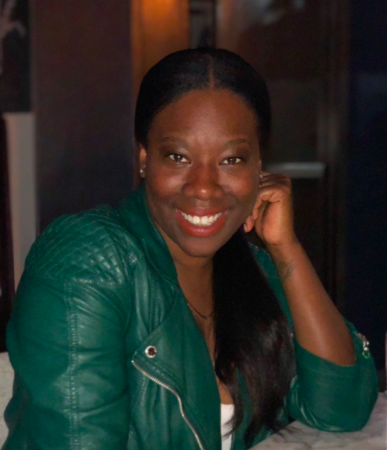Danielle Leslie is a unicorn. In the tech world, the mythical moniker describes a business value of over $1 billion. However, Leslie is rare for mastering course creation with Course From Scratch, a 60-day online intensive that helps individuals transform their everyday passions and expertise into a profitable online course. With just one online class, the educational startup generated over $10 million in revenue in four years.
“We didn’t have any venture funding or an existing audience,” Leslie said. “I was a nobody and really built this from nothing over just four years.”
Before monetizing her knack for teaching others how to brand their knowledge, the Palmdale, Ca. native, early on, was steadfast on a career path toward obstetrics. Although through her high school experiences—prom queen elections and campaigns for class president—she uncovered her enthusiasm for marketing. Fast forward to leaving her first job out of college then later becoming a successful online marketer in Silicon Valley, she eventually ditched that typical 9-to-5 lifestyle for full-time entrepreneurship.
Setbacks and comebacks along the way, including a full-time position at Udemy as an internal course launch coach, helped Leslie perfect what is now a scalable online education ecosystem. Using Course From Scratch’s unique Culture Add quiz and a simplified framework, she has empowered over 5,000 people to make money teaching what they love based on their life experiences.
“The critical thing is like just pure focus on one course, one funnel,” Leslie said. “I was able to get to my first million as a mostly one-woman show.”
AfroTech spoke to Leslie about major milestones for Course From Scratch, the benefits of sticking with corporate while becoming an entrepreneur, and charging what you’re worth.
Editorial Note: This interview has been edited for clarity and length.
AfroTech: What first sparked the idea for Course From Scratch?
Danielle Leslie: It was very organic. In 2010, a friend of mine pitched this idea to start a meetup tour, where we would bring together millennials from all over the country and talk to them about how to brand themselves online. The tour ran for 40 days in 13 cities.
After our tour, we had people who were branding themselves and making money online. We had people telling us to create e-books and sell online. But a year later, we ended up kind of dismantling our startup because we basically ran out of money, so I moved back in with my mom and started over.
I started out working with friends and giving advice, and then it kind of snowballed into this business.
AT: What was that change to entrepreneurship like?
DL: I launched my first online course called Press Play in 2012, and it was based on that whole tour experience, helping other people create projects around their passion. But I didn’t know what I was doing. I was just throwing everything at the wall when I needed to focus on one thing. I got one sale for $1000 but it wasn’t going to pay the bills. That’s when I joined Udemy full-time.
AT: What are some of the benefits of working at a company while figuring out how to move forward as an entrepreneur?
DL: For me, the benefit of working at that institution before doing it on my own was that I got to work with hundreds of individuals. Some were influencers who had a million Twitter followers or half a million YouTube subscribers, and I got to have real conversations with them where I learned that they were running out of money. I realized there was a huge gap when you’re creating content and relying on a brand or a platform to pay you. You have no control. So because of those trends, I realized that I needed to focus on direct-to-consumer marketing so that I can get paid from day one. That was a huge point of inspiration [for Course From Scratch].
Secondly, I saw that everyday people who didn’t have a following online or passion had life experiences. Each person has a cultural advantage that someone needs to learn from right now and don’t take that for granted.
AT: After witnessing the pitfalls of the B2B marketing, was avoiding investors and funding for Course From Scratch intentional?
DL: It was mainly because of my background in Silicon Valley, and because I tried the whole startup route with the tour. We actually got funding for that from an accelerator program. That experience showed me that these investors are not sending us down the path of revenue, so I decided to monetize from day one. I own 100% of my company. So when I say that we made $990,000 in April, I have a hundred percent ownership of that.
There is this popular narrative right now where if you raise money, you are celebrated. But what we don’t talk about is that over 90% of businesses don’t need venture capital. So, yes, I intentionally wanted to own a product that solved a real problem, specifically around my culture, my struggle, my story.
AT: That brings me to the Culture Add quiz. Does it help you discover what topic to teach?
DL: Yes, because that’s the number one question we get. What should I create a course on? There are seven different culture add types and the quiz uncovers what type you are and provides you with an example of a student who matches that type, who took their results, experiences, and skills and created a course. It will inspire you and show you that you are already ready to teach your own course.
AT: Do you define the success of your business by the personal success of your students?
DL: Absolutely. From the course we’ve created a few millionaires in just the last two years, all women, including Tara Reed, a Black woman in tech who teaches How to Build Apps Without Code and Teri Ijeoma, a former assistant vice principal, who now offers a course called Trade and Travel.
There’s a direct correlation between our business thriving and the people we’re helping. Every time we have our biggest month, that also means that our students are having their biggest months.
AT: A standout factor about Course From Scratch is the premium price point. Do you school your students on what to charge for their courses?
DL: Yes, there’s a lesson where I go over six different things to look at when you’re pricing your course. The thing is [hesitance to charge a premium] points back and starts at that core belief that you’re not enough. When we surveyed our students about what they gained from Course From Scratch, the number one thing they said was self-acceptance.
From day one, the program sends a message loud and clear that you are already enough. You are already ready. You have everything you need because it starts with your story, your culture add. We show you how to make life-changing transformations in people’s lives, and when you can do that, you can justify the price. I took the Henry Ford quote [“Whether you think you can, or think you can’t, you’re right.”] and remixed it: “Whether you think you’re worth a hundred dollars or a thousand dollars, you’re right.”
AT: What’s next for Course From Scratch?
DL: Course Alchemy is our next program. It’s an advanced program that helps people transform your course into a six or seven-figure business that allows you the freedom to work from anywhere and to have a lean team, which is essentially what I’ve done. The course is going to show people, who are in pursuit of that four-hour workweek, how to scale their course into a real business through webinars and ads. Essentially, we’re giving people the blueprint so they can do it, too.
Ever wondered how your skills could add to the culture? Take the quiz to discover your unique Culture Add and the type of course you can create and launch today!


